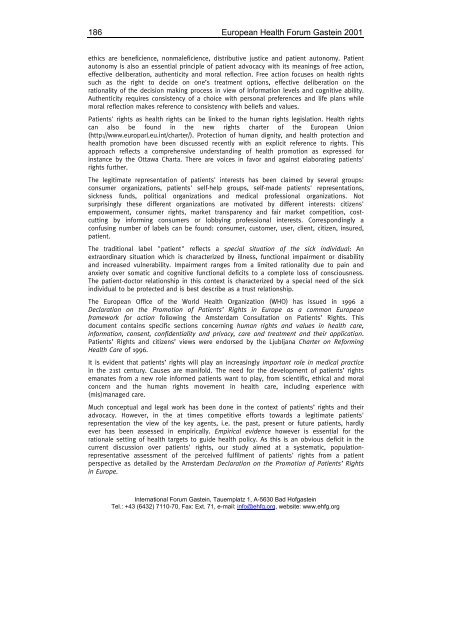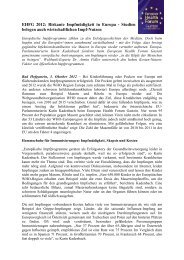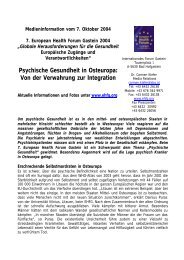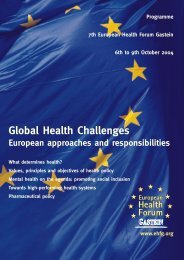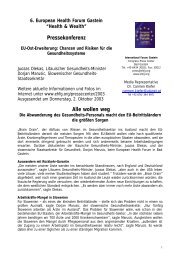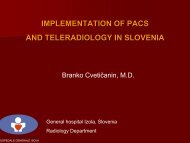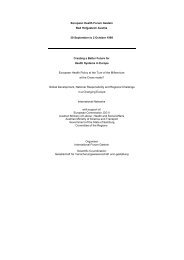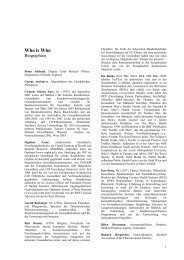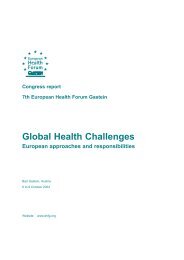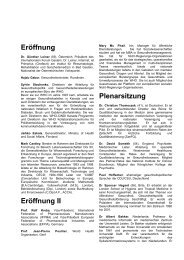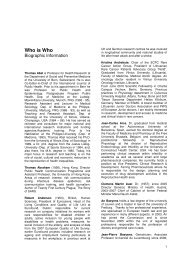Congress report - European Health Forum Gastein
Congress report - European Health Forum Gastein
Congress report - European Health Forum Gastein
You also want an ePaper? Increase the reach of your titles
YUMPU automatically turns print PDFs into web optimized ePapers that Google loves.
186<br />
<strong>European</strong> <strong>Health</strong> <strong>Forum</strong> <strong>Gastein</strong> 2001<br />
ethics are beneficience, nonmaleficience, distributive justice and patient autonomy. Patient<br />
autonomy is also an essential principle of patient advocacy with its meanings of free action,<br />
effective deliberation, authenticity and moral reflection. Free action focuses on health rights<br />
such as the right to decide on one’s treatment options, effective deliberation on the<br />
rationality of the decision making process in view of information levels and cognitive ability.<br />
Authenticity requires consistency of a choice with personal preferences and life plans while<br />
moral reflection makes reference to consistency with beliefs and values.<br />
Patients' rights as health rights can be linked to the human rights legislation. <strong>Health</strong> rights<br />
can also be found in the new rights charter of the <strong>European</strong> Union<br />
(http://www.europarl.eu.int/charter/). Protection of human dignity, and health protection and<br />
health promotion have been discussed recently with an explicit reference to rights. This<br />
approach reflects a comprehensive understanding of health promotion as expressed for<br />
instance by the Ottawa Charta. There are voices in favor and against elaborating patients'<br />
rights further.<br />
The legitimate representation of patients' interests has been claimed by several groups:<br />
consumer organizations, patients' self-help groups, self-made patients' representations,<br />
sickness funds, political organizations and medical professional organizations. Not<br />
surprisingly these different organizations are motivated by different interests: citizens'<br />
empowerment, consumer rights, market transparency and fair market competition, costcutting<br />
by informing consumers or lobbying professional interests. Correspondingly a<br />
confusing number of labels can be found: consumer, customer, user, client, citizen, insured,<br />
patient.<br />
The traditional label "patient" reflects a special situation of the sick individual: An<br />
extraordinary situation which is characterized by illness, functional impairment or disability<br />
and increased vulnerability. Impairment ranges from a limited rationality due to pain and<br />
anxiety over somatic and cognitive functional deficits to a complete loss of consciousness.<br />
The patient-doctor relationship in this context is characterized by a special need of the sick<br />
individual to be protected and is best describe as a trust relationship.<br />
The <strong>European</strong> Office of the World <strong>Health</strong> Organization (WHO) has issued in 1996 a<br />
Declaration on the Promotion of Patients’ Rights in Europe as a common <strong>European</strong><br />
framework for action following the Amsterdam Consultation on Patients’ Rights. This<br />
document contains specific sections concerning human rights and values in health care,<br />
information, consent, confidentiality and privacy, care and treatment and their application.<br />
Patients’ Rights and citizens’ views were endorsed by the Ljubljana Charter on Reforming<br />
<strong>Health</strong> Care of 1996.<br />
It is evident that patients’ rights will play an increasingly important role in medical practice<br />
in the 21st century. Causes are manifold. The need for the development of patients’ rights<br />
emanates from a new role informed patients want to play, from scientific, ethical and moral<br />
concern and the human rights movement in health care, including experience with<br />
(mis)managed care.<br />
Much conceptual and legal work has been done in the context of patients’ rights and their<br />
advocacy. However, in the at times competitive efforts towards a legitimate patients'<br />
representation the view of the key agents, i.e. the past, present or future patients, hardly<br />
ever has been assessed in empirically. Empirical evidence however is essential for the<br />
rationale setting of health targets to guide health policy. As this is an obvious deficit in the<br />
current discussion over patients' rights, our study aimed at a systematic, populationrepresentative<br />
assessment of the perceived fulfilment of patients' rights from a patient<br />
perspective as detailed by the Amsterdam Declaration on the Promotion of Patients’ Rights<br />
in Europe.<br />
International <strong>Forum</strong> <strong>Gastein</strong>, Tauernplatz 1, A-5630 Bad Hofgastein<br />
Tel.: +43 (6432) 7110-70, Fax: Ext. 71, e-mail: info@ehfg.org, website: www.ehfg.org


